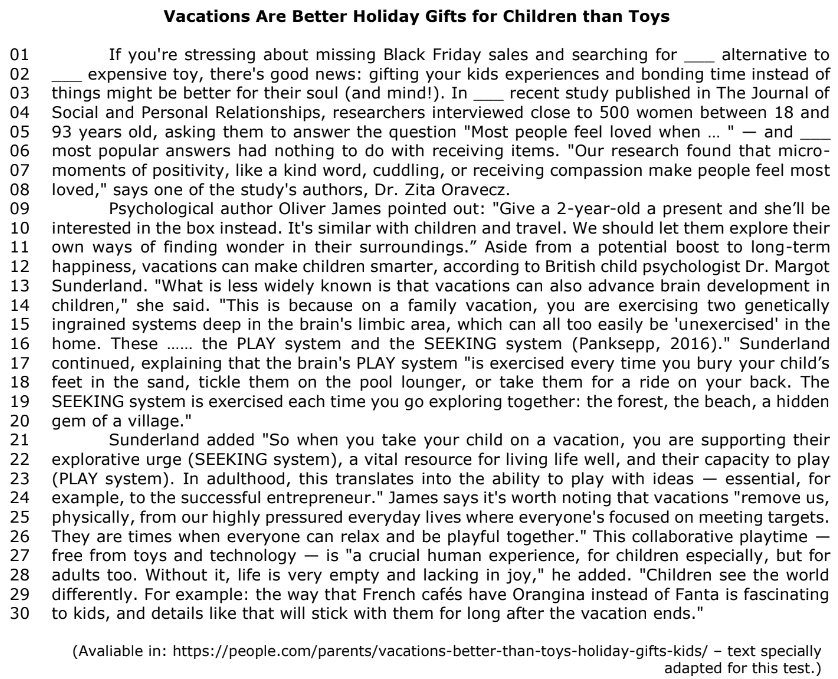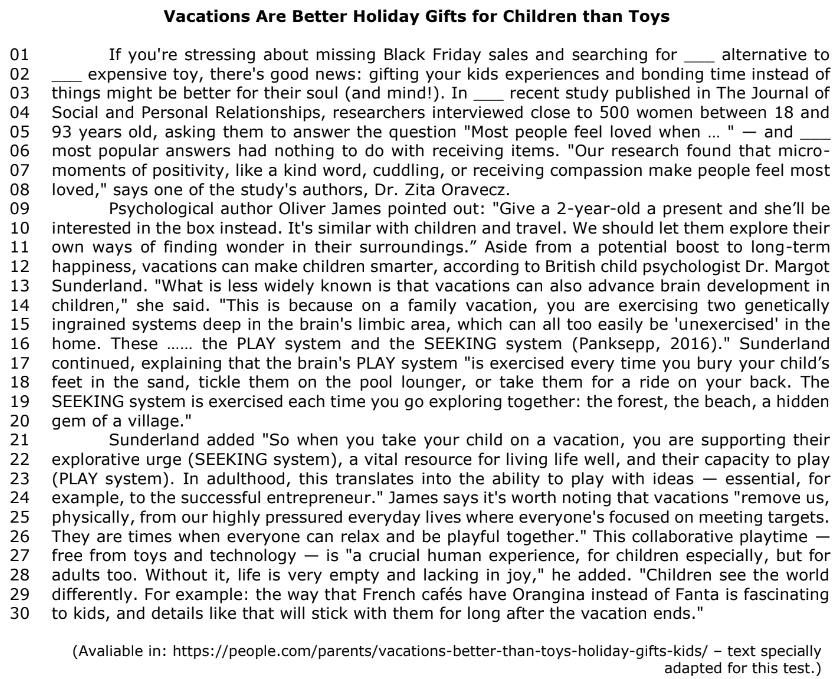Check the alternative that best completes the gap in the following sentence.
The Chef tasted your food and said it ________ too salty.
Choose the meaning of the verb HAD on the following sentence:
The teacher had her class write na essay.
Choose the correct formo f the verb to fi the sentence.
Don’t forget __________ your homework.
Text 1:
How being bilingual can boost your career
Whether you’re fresh out of college or a seasoned executive, insiders agree that fluency in a second language can not only help you stand out among prospective employers, it can also open doors to opportunities that those without foreign language skills might miss.
In today’s global economy, the ability to communicate in another language has become a significant advantage in the workforce. Research has found that people who speak at least one foreign language have an average annual household income that’s $10,000 higher than the household income of those who only speak English. And about 17 percent of those who speak at least one foreign language earn more than $100,000 a year.
A recent survey found that nearly 9 out of 10 headhunters in Europe, Latin America, and Asia say that being at least bilingual is critical for success in today’s business environment. And 66 percent of North American recruiters agreed that being bilingual will be increasingly important in the next 10 years.
“In today’s global economy you really have to understand the way business is done overseas to maximize your potential. A second language equips you for that,” says Alister Wellesley, managing partner of a Connecticut-based recruiting firm. “If you’re doing business overseas, or with someone from overseas, you obtain a certain degree of respect if you’re able to talk in their native language.”
Language skills can also be key for service industries. At the Willard InterContinental Washington, a luxury hotel a few blocks from the White House, a staff of about 570 represents 42 nations, speaking 19 languages. The Willard’s front-of-house employees such as the concierge speak at least two languages. Bilingualism is not an absolute requirement, but it is desirable, according to Wendi Colby, director of human resources.
Workers with skills in a second language may have an edge when it comes to climbing Willard’s professional ladder. “The individual that spoke more languages would have a better chance for a managerial role, whatever the next
level would be,” Colby says. “They are able to deal with a wide array of clients, employees.”
So which languages can give you a leg up on the job market? Insiders agree the most popular – and marketable – languages are Spanish, German, French, Italian, Russian and Japanese, with a growing emphasis on Mandarin, given China’s booming economy. So let’s learn Mandarin!
“We see demand from a full range of industries,” says Wellesley. “Actually it depends on which company you’re working for and the country in which they’re located.”
Adapted from: LATHAM-KOENIG, Christina & OXENDEN,
Clive. American English File 5. 2nd edition. Oxford: OUP,
2018.
Choose the expression taken from the text that CANNOT be considered a nominal group.
Text 1:
How being bilingual can boost your career
Whether you’re fresh out of college or a seasoned executive, insiders agree that fluency in a second language can not only help you stand out among prospective employers, it can also open doors to opportunities that those without foreign language skills might miss.
In today’s global economy, the ability to communicate in another language has become a significant advantage in the workforce. Research has found that people who speak at least one foreign language have an average annual household income that’s $10,000 higher than the household income of those who only speak English. And about 17 percent of those who speak at least one foreign language earn more than $100,000 a year.
A recent survey found that nearly 9 out of 10 headhunters in Europe, Latin America, and Asia say that being at least bilingual is critical for success in today’s business environment. And 66 percent of North American recruiters agreed that being bilingual will be increasingly important in the next 10 years.
“In today’s global economy you really have to understand the way business is done overseas to maximize your potential. A second language equips you for that,” says Alister Wellesley, managing partner of a Connecticut-based recruiting firm. “If you’re doing business overseas, or with someone from overseas, you obtain a certain degree of respect if you’re able to talk in their native language.”
Language skills can also be key for service industries. At the Willard InterContinental Washington, a luxury hotel a few blocks from the White House, a staff of about 570 represents 42 nations, speaking 19 languages. The Willard’s front-of-house employees such as the concierge speak at least two languages. Bilingualism is not an absolute requirement, but it is desirable, according to Wendi Colby, director of human resources.
Workers with skills in a second language may have an edge when it comes to climbing Willard’s professional ladder. “The individual that spoke more languages would have a better chance for a managerial role, whatever the next level would be,” Colby says. “They are able to deal with a wide array of clients, employees.”
So which languages can give you a leg up on the job market? Insiders agree the most popular – and marketable – languages are Spanish, German, French, Italian, Russian and Japanese, with a growing emphasis on Mandarin, given China’s booming economy. So let’s learn Mandarin!
“We see demand from a full range of industries,” says Wellesley. “Actually it depends on which company you’re working for and the country in which they’re located.”
The sentence “Bilingualism is not an absolute requirement, but it is desirable” could be rewritten, with no change in meaning, as:
Text 1:
How being bilingual can boost your career
Whether you’re fresh out of college or a seasoned executive, insiders agree that fluency in a second language can not only help you stand out among prospective employers, it can also open doors to opportunities that those without foreign language skills might miss.
In today’s global economy, the ability to communicate in another language has become a significant advantage in the workforce. Research has found that people who speak at least one foreign language have an average annual household income that’s $10,000 higher than the household income of those who only speak English. And about 17 percent of those who speak at least one foreign language earn more than $100,000 a year.
A recent survey found that nearly 9 out of 10 headhunters in Europe, Latin America, and Asia say that being at least bilingual is critical for success in today’s business environment. And 66 percent of North American recruiters agreed that being bilingual will be increasingly important in the next 10 years.
“In today’s global economy you really have to understand the way business is done overseas to maximize your potential. A second language equips you for that,” says Alister Wellesley, managing partner of a Connecticut-based recruiting firm. “If you’re doing business overseas, or with someone from overseas, you obtain a certain degree of respect if you’re able to talk in their native language.”
Language skills can also be key for service industries. At the Willard InterContinental Washington, a luxury hotel a few blocks from the White House, a staff of about 570 represents 42 nations, speaking 19 languages. The Willard’s front-of-house employees such as the concierge speak at least two languages. Bilingualism is not an absolute requirement, but it is desirable, according to Wendi Colby, director of human resources.
Workers with skills in a second language may have an edge when it comes to climbing Willard’s professional ladder. “The individual that spoke more languages would have a better chance for a managerial role, whatever the next level would be,” Colby says. “They are able to deal with a wide array of clients, employees.”
So which languages can give you a leg up on the job market? Insiders agree the most popular – and marketable – languages are Spanish, German, French, Italian, Russian and Japanese, with a growing emphasis on Mandarin, given China’s booming economy. So let’s learn Mandarin!
“We see demand from a full range of industries,” says Wellesley. “Actually it depends on which company you’re working for and the country in which they’re located.”
Adapted from: LATHAM-KOENIG, Christina & OXENDEN, Clive. American English File 5. 2nd edition. Oxford: OUP, 2018.
Wendy told John, one of her coworkers: “Don’t be late!”
Choose, among the options below, the correct sentence in reported speech:
According to text 2, teachers should give students advice.
Choose the only sentence below in which the noun ADVICE is used correctly.
Select the alternative that correctly fills the blanks in lines 01, 02, 03 and 05.
Check the alternative that best completes the gap in the following sentence.
After Jake _______ for fourty minutes, he began to feel tired.
Choose the correct formo f the verb to fi the sentence.
I tried _______him, but it was hard.
According to the text, most headhunters believe that being bilingual is critical for success in the business world. The word CRITICAL in this context means:
The modal MIGHT in “ it can also open doors to opportunities that those without foreign language skills might miss”, and the modal MAY in “workers with skills in a second language may have an edge when it comes to climbing Willard’s professional ladder” indicate in these contexts the idea of:
Choose the verb form that completes the sentence below correctly:
Wendy has decided to give up _________ at the hotel.




